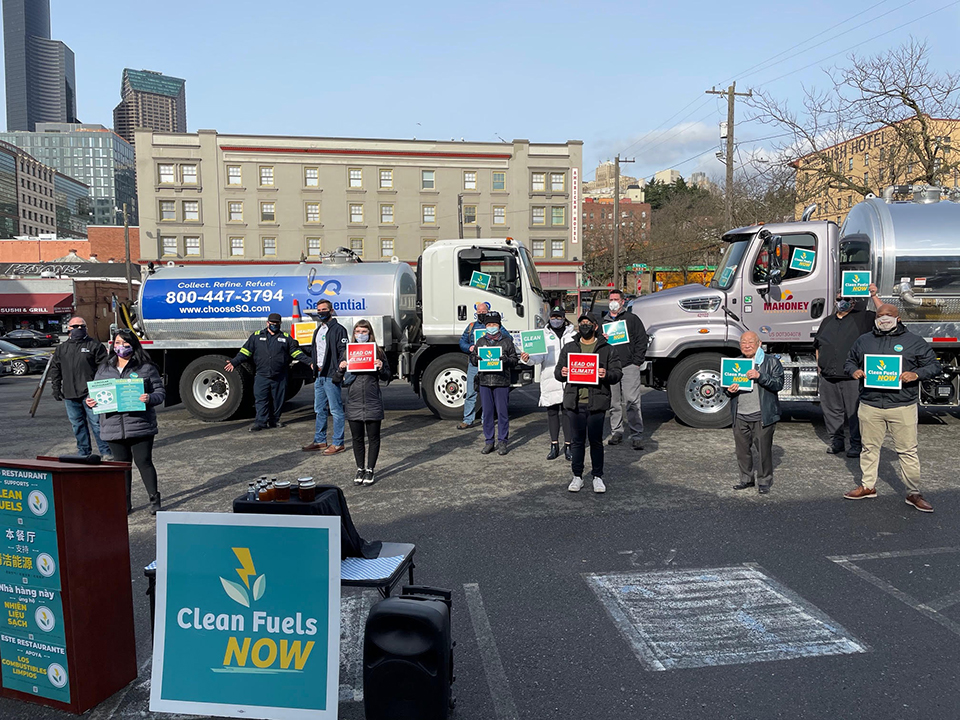By Becky Chan
Northwest Asian Weekly

Supporters of Clean Fuels Now rally in the ID on Feb. 24. (Photo by Becky Chan)
“Do your french fries fight climate change?” the ad asks. What about pork katsu or egg rolls? Yes! It’s a thing—fryer grease can become low carbon clean fuel. Affordable, sustainable, and healthy? Some think so. Supporters are campaigning for the passage of House Bill (HB) 1091, proposing a clean fuel standard to reduce the carbon intensity of transportation fuel. Used cooking oil may become a hot commodity in the future.
On Feb. 24, a coalition of environmental groups, all holding signs with the slogan “Clean Fuel Now,” gathered in the back parking lot of Uwajimaya on 6th Avenue South to celebrate “Circular” Restaurant Week. The event highlights 30 Chinatown-International District (ID) businesses who participate in waste cooking oil recycling. Biofuel production companies have been collecting used cooking oil from food-related businesses and turning them into clean fuels for years. By keeping the used oil “in the loop” longer, the circular process minimizes the use of limited resources and eliminates waste. It is a preferred sustainable approach to the traditional linear economy of “take, make, and dispose.”
Last December, Gov. Jay Inslee announced an ambitious climate policy package for 2021–2023, aiming to reduce 35% of carbon emissions by 2030. A clean fuel standard is part of the policy package and necessitates fuel suppliers to sell cleaner oil with lower carbon. Almost half of the state’s greenhouse gas emission is from the transportation sector. Fuels with less carbon emit less greenhouse gas. The result is cleaner air.

Ali Lee speaks at “Circular Restaurant Week,” a Clean Fuels Now event. (Photo by Becky Chan)
In 2016, the Puget Sound Clean Air Agency conducted a study of the air quality in the ID with multiple monitoring points. The one-year study measured 100 air toxins in the community and found 14 above its screening value of potential cancer risk. With I-5 and I-90 crisscrossing above the neighborhood, to no one’s surprise, the major pollutant in the ID is from fossil fuel exhaust, the study found.
Exposure to air pollutants can compromise the body’s respiratory system—-a compromise that is risky, especially during the outbreak of the coronavirus that attacks the lungs.
According to the 2020 Healthy Community Action Plan for CID, the neighborhood’s “poor air quality contributes to more asthma, respiratory, and cardiac-related hospital visits per capita than 99% of other Puget Sound neighborhoods.”
Ali Lee with King County Climate Reality Project believes clean fuel will help clean up the air in CID. “We want to highlight the businesses that are doing their part in cleaning up the air that we are breathing,” she said. She wants the legislators to do their part, too.
“Clean fuels are a way to build our community. When you eat out and order a meal from one of the restaurants in the area, you are helping Washington state by increasing jobs, supporting our small businesses, cleaning the air we breathe, and helping our climate,” Lee said.
Tomio Moriguchi, owner of Uwajimaya, recalled making fish cakes with his father and wondered what happened to the used oil in those days.
“We probably just dumped it. I hate to say it,” he said.
Many businesses still just dump it, adding to problems of clogged pipes or blocked filters at wastewater treatment plants. More resources are required to remove the fat, oil, or grease. The most efficient way is to stop it at the source.
Moriguchi believes in innovation and appreciates the opportunity to participate in a new technology that allows Uwajimaya to recycle the waste oil and benefit the environment.
Mahoney Environmental-Neste (ME-N) and SeQuential are two of the waste oil recycling companies represented at the ID event. The companies supply the receptacles that businesses fill with discarded cooking oil. Trucks with stainless steel tanks make the rounds in the ID several times a week to pump out the dirty oil, usually late at night when businesses are closed. ME-N collects about 20,000 gallons annually from the ID. The service is free, and in return the company profits from the oil and finished products.
The waste oil is processed at refineries. Most of the clean oils are shipped elsewhere in a viable market where there are incentives or clean fuel standards. California and Oregon are such markets. Although Washington was a top 10 biodiesel producer in 2018 with 1.9 million barrels (80 million gallons), the state didn’t crack the top 10 as a consumer, according to data collected by U.S. Energy Information Administration. Proponents hope with the passage of HB 1091, demand for clean oil will increase. Perhaps with it also comes jobs.
Elijah Worley, regional account manager with ME-N, surmised that not everyone is on board with the idea of recycling used cooking oil. The lack of awareness of the benefits to the business and the environment contribute to the hesitancy.
“The Clean Fuels Now movement is so important to the efforts of educating the public and other business owners,” Worley stated.
Legislators need to be educated, too. On Feb. 27, HB 1091 passed in the House chamber with a vote of 52-46. The bill was scheduled for debate in the Senate in early March.
For a list of the participating restaurants, go to cleanfuelswork.com/restaurants.
Becky can be reached at info@nwasianwekly.com.



